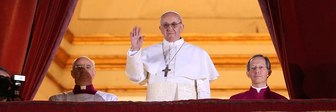Peter Kellner explains how today's leaders can learn much from previous election results...even if they seem to bear no resemblance to current events
For executives in a high-tech medium, television channel controllers seem strangely fond of tradition; and never more so than on bank holidays. These used to be occasions for a teatime viewing of old James Bond films on ITV. Now, BBC’s Parliament channel offers an all-day festival of old election results programmes. Next week sees the tenth anniversary of the 2001 election, so yesterday we had an 11-hour treat of reliving Tony Blair’s second landslide.
What a difference a decade makes. Labour, with more than 400 seats, was riding high. The Liberal Democrats were celebrating the best third-party result for seventy years and could look for yet further successes in local and by-elections. As David Dimbleby remarked ruefully as he signed off on the Friday afternoon, they were back to where they were 24 hours earlier. Blair continued to be master of all he surveyed. The Conservatives were flat on their back, and starting the search for a new leader. Surely things were so different then that they hold no lessons for today?
Actually, I think today’s leaders have much to learn. The signs were there that politics had changed, but they received only a glancing mention at the time. As viewers who paid close attention noticed, the low turnout – down 12 points to 59% - meant that Labour was backed by a smaller share of the electorate (just 25%) than any party ever winning an overall majority. It was a half-hearted landslide, evidence more of disdain for a still-unelectable Conservative Party than enthusiasm for Labour’s first term.
Looking back, I would go further. In 1997, Labour had benefitted massively from the public’s wholesale rejection of John Major’s Tories. Blair capitalised on this by persuading middle England that Labour would take no risks with the economy. It would not spend recklessly; income tax rates would not be raised. Beyond that, Labour promised little. It went out of its way NOT to paint a picture of a radically different Britain.
As an election-winning strategy, this was masterful. But it left Labour with a challenge – to do things in government that it had studiously avoided doing in opposition, to convert a one-off decision by millions of voters to kick out the Tories into what, in a commercial context, would be called brand loyalty. Labour had the chance to building a new, lasting coalition of support for its progressive values.
It failed to do so. The size of Labour’s majority in 2001 concealed the fact that it had lost almost three million votes. Even though the economy boomed and most voters felt better off, Labour won fewer votes that it had in 1992, when it suffered its fourth consecutive defeat. Although Labour went on to win a further election in 2005, the seeds of its subsequent decline were sown in that first term. Even before the Iraq war, Labour was on the slide, yet few noticed.
What, then, are the lessons for today? Here are my messages to the three party leaders:
- David Cameron: like Tony Blair, you rode to power on a wave of discontent directed at the last government. And like Blair, you were careful not to promise too much. Now, you need to succeed where Blair failed (and, though you prefer to ignore her, Margaret Thatcher succeeded in the Eighties), and build positive enthusiasm for your party. Otherwise you will rely on a buoyant economy and the public continuing to reject the Labour opposition. That may not be enough.
- Ed Miliband: Don’t allow the Tories to win next time by default, as the Tories allowed Labour to win by default in 2001 and 2005. Above all, this means avoiding the reputation that dogged William Hague, Iain Duncan Smith and Michael Howard, of being an extremist. That is not all. Like Blair in the mid-Nineties and Cameron more recently, you need to persuade voters that Labour has changed. Then, if voters think the Tories have failed, you stand a real chance of becoming Prime Minister – and then rising to the challenge that Blair fluffed and Cameron now faces, of building a lasting coalition of support based on your values.
- Nick Clegg: Plainly, your task would be far easier if you, like Charles Kennedy in 2001, could lob hand grenades into the Government from the safety of opposition. In time, that may indeed be the most attractive option; but it isn’t now. Towards the end of the 2001 results programme, Professor Anthony King said perceptively that the Lib Dems needed to carve out a distinct identity and purpose, and not continue to rely on being a receptacle for protest votes. Your party didn’t make the change then, and hasn’t since, and that is part of the reason why you are now suffering.
In other words, the secret truth about the 2001 election is that all three main parties faced, and failed to address, crises of identity. Ten years on, the leaders are different and all three parties have swapped roles between government and opposition. Yet the fundamental need to establish clear, relevant and electorally appealing identities remains.









